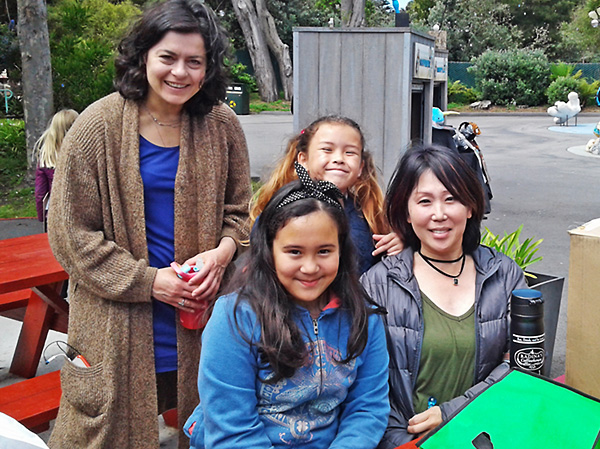- Domestic Violence Prevention
- Emergency Assistance
- Parenting
- Seniors
- YouthFirst
Our lives can feel upside down or even unlivable if someone seeks to harm us through bullying or deliberate behaviors to maintain a pattern of power and control—the definition of domestic violence. That’s why every day JFCS’ programs work to prevent cycles of abuse so that children, teens, adults, and seniors have the support they need to make healthy choices, leave abuse behind, and live their best lives.
For Domestic Violence Survivors, Leaving Is Just the Beginning
JFCS’ Dream Program changes the cycle of abuse by providing critically needed support to women and their children so they can rebuild their lives after leaving their abusers. It offers a fresh start and a welcoming community that understands the challenges of building peace at home.
A stay in a shelter is common—nationwide domestic violence survivors currently make up approximately 12% of the sheltered homeless population. That’s where Tamar, her infant son, and teenage daughter were living when she got a referral to a Dream Program caseworker.

Families from JFCS’ Dream Program for domestic violence survivors on a weekend outing to the SF Zoo.
JFCS’ Dream Program moved Tamar and her family into an apartment quickly by providing the security deposit and a rental subsidy so that she could focus on work and stabilizing her family. She and her children are now doing much better. With the Dream Program standing beside her, Tamar has the emotional support and strength she needs to navigate through difficult legal and financial litigation.
There isn’t a “one-size-fits-all” approach to help survivors of domestic violence. Each client comes to JFCS with a unique set of challenges and personal traumas. Although case management and financial assistance are crucial parts of how JFCS’ Dream Program leads clients to stability, Tamar says that it is the way she has been treated by the JFCS staff and Dream Team volunteers that has made the biggest difference in her recovery.
“The hands-on, one-on-one support has been enormous. I don’t feel like just a case number. The services are warm and in family-like settings and the volunteers are a great, great help too. All the support is what helps the most.”
Since JFCS expanded its domestic violence program last spring the demand for the services continues to grow. Kelsey Friedman, JFCS’ Director of Family Support Services, says, “There are certainly some wonderful organizations that work with survivors in the Bay Area, but few have the ability to provide wrap-around, inclusive services that move women through the initial crisis to stability and into self-sufficiency. That is what the Dream Program does every day.”
Looking out for the Most Vulnerable—Seniors Who Need Care
Elders also face a threat from those who may use power and control to take advantage of them. A comprehensive review article in the New England Journal of Medicine found that 1 in 10 Americans aged 60+ have experienced some form of emotional, financial, or physical abuse. Social isolation and conditions like dementia make seniors even more vulnerable to deception or intimidation by people they think they can trust—whether it’s a family friend, a sales person on the phone, or a professional hired to help them.
JFCS’ Seniors At Home program works with older adults and their families to keep them safe and well cared for with programs such as Home Care, Dementia Care, Fiduciary Services, and Healthcare Advocacy.
“Sadly, abuse of older adults is all too common and there is significant underreporting of such incidents,” says Traci Dobronravova, MSW, Director of JFCS’ Seniors At Home. “Our team is always looking carefully for signs of neglect or abuse in the seniors we care for and is ready to step in when necessary to ensure their safety.”
Supporting Families, Parents, and Children with Life’s Stressors and Bullying Prevention
Working parents may often feel overwhelmed and emotionally over-resourced—juggling the demands of work, home, and even sometimes caregiving to aging parents. Adults regularly come to JFCS for Counseling and Consultation to work with highly trained clinicians, including Russian-speaking licensed social workers, to address their life stressors.
Violence Prevention for Teens Creates Healthy Patterns for Life
Unhealthy relationship patterns can start during the teenage years when adolecents are more prone to absorb messages from the media and their peers, and may assume that abusive and controlling behaviors are normal and acceptable. Yet teens in unhealthy relationships experience higher rates of depression, anxiety and alcohol and drug use, as well as thoughts of suicide.
JFCS’ YouthFirst Program helps teens to develop the necessary life skills to foster and support healthy relationships. Discussions and workshops around finding one’s place in the world, communicating personal needs and conflict resolution, are important parts of the curriculum in YouthFirst’s Summer Internship Program and Impact Year.
Nancy Masters, JFCS’ Associate Executive Director, says that preventing and serving those who have faced abuse is key to the agency’s mission. She adds, “JFCS is here to make sure that every person has the support to meet a personal crisis or challenge. Even in the most difficult situations, we have the expertise and the knowledge to create safety and positive change.”
JFCS’ services are funded by fees for services and by generous individuals, foundations, and endowment funds.
To donate please contact Barbara Farber at [email protected], 415-449-3858, or click here to give online.
